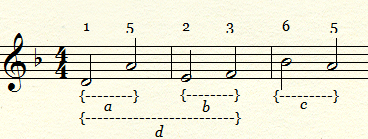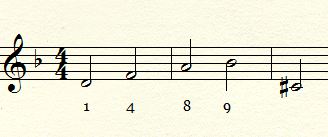Alphametics is the art of substituting letters for numbers in a valid simple addition sum. The letters must correspond to a particular word. The first modern alphametic was published by H.E. Dudeney in the July 1924 issue of Strand Magazine:
SEND +
MORE
-----
MONEY
Only one solution is valid:
9567 +
1085
-----
10652
There are some interesting and compelling alphametics corresponding to Bach and more specifically to his magnificent Art of Fugue and A Musical Offering.
First of all, let us consider two alphametics regarding BACH AND MUSIC:
BACH +
AND
-----
MUSIC
This yields two results:
9738 +
725
-----
10463
9735 +
728
-----
10463
Bach was very interested in numerology and considered the number five to be his personal number. The sum of the results (in red) of the above alphametic is five:
1+4+6+3=14
14 can be 'reduced' to five by simple addition:
1+4=5
The sum of the letters in Bach's name also result in 5:
BACH = 14 (2+1+3+8=14)
J.S.BACH = 14
Next, let us consider some Alphametics around DIE KUNST DER FUGUE:
DIE (2) +
KUNST (4)
-----
FUGUE
804 +
12679 (Reduce to 7 - 1+2+6+7+9=25: 2+5=7)
-----
52324 (Reduce to 7 - 5+2+3+2+4=16: 1+6=7)
825 +
19495
-----
79630 (Reduce to 7 - 7+9+6+3=25: 2+5=7)
Now in French; L'ART DE LA FUGUE:
LART +
DE (4)+
LA
-----
FUGUE
9847
65
98
-----
10205
9754 +
86 +
97
-----
10206
Now, take the sum of the results from DIE KUNST DER FUGUE and L'ART DE LA FUGUE:
52324 +
79630
------
131954
10205 +
10206
------
20411
131954 +
20411
------
152365
The sums of the individual numbers in the above correspond to successive Fibonacci Numbers:
1+3+1+9+5+4=23 (5)
2+0+4+1+1=8 (8)
1+5+2=8 (8)
1+5+2+3=11 (11)
6+5=11 (11)
Most interesting is how the final sum (152365) corresponds to the notes of the main subject in The Art of Fugue:


a = Perfect 5th
b= Rising minor 2nd
c = falling Minor 2nd
d = Minor 3rd
Bach and the New Fibonacci Gematria
The first 25 numbers in the Fibonacci Sequence are:
0, 1, 1, 2, 3, 5, 8, 13, 21, 34, 55, 89, 144, 233, 377, 610, 987, 1597, 2584, 4181, 6765, 10946, 17711, 28657, 46368
Disregard the first zero and reduce the double digit numbers (i.e. 13 is 1+3=4, 21 is 2+1=3):
1,1,2,3,5,8,4,3,7,1,8,9,8,8,7,6,4,1,5,6,2,8,1,9
Now place these numbers in a 6 by 4 table:
1 1 2 3 5 8
4 3 7 1 8 9
8 8 7 6 4 1
5 6 2 8 1 9
Substitute the numbers for letters in the following manner to yield the following Gematria:
A E I/J N R W
B F K O S Y
C G L P T Y
D H M Q U/V Z
The first column corresponds to the Tonic, Subdominant and Dominant
1 4th 8th 5th
Tonic Subdominant Octave Dominant
The letters also correspond to Pitch Classes resulting in the major/minor triad:
1 4 8 5
Root Minor 3rd Perfect 5th Major 3rd
This corresponds to the main subject in The Art of Fugue:
D A F D
1 8 4 1
In this Gematria, F is equivalent to 4 (minor 3rd) and 5 corresponds to F#, the sharpened third (Tierce de Picardie) used in the final note of a Minor key Perfect Cadence.
An interesting result is obtained if we intertwine the letters of BACH and W.T.C (Well Tempered Clavier):
1 6 --|
|-- 4 8 --| BACH
W.T.C |-- 8 4 --|
6 1 --| BACH
Now, consider the table with special reference to the bold, red digits:
1 1 2 3 5 8
4 3 7 1 8 9
8 8 7 6 4 1
5 6 2 8 1 9
The numbers correspond to the first four notes from the Royal Theme in A Musical Offering:
D F A Bb
1 4 8 9

Finally, there are interesting corrolations to Bach's name in the top row of the table:
J (n) S (e b n) B A C H
10 14 19 5 2 14 2 1 3 8
1 5 1 5